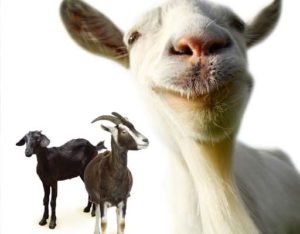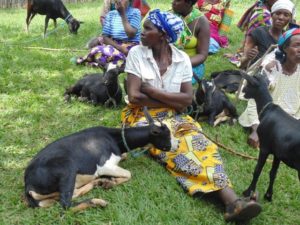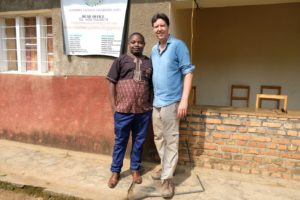In collaboration with the local partner NUFASHWA YAFASHA (which means: those who receive help can in turn help others) this project is running in Gatsibo district, Rwanda. Donating a goat to very poor families makes it possible for them to send a child to school. Moreover, this project contains a continuity principle. You can read below how this works.
The Province of West Flanders and the Flemish-Rwandan Association Umubano vzw are jointly responsible for the project financing..
Read hereafter the full description of this project.
1.1 Target population of the organization:
Thirty very poor families with children living in the Gatsibo-Ngarama region.
1.2 Establishment of the organization:
Jean-Paul Bujyacyera founded the NUFASHWA YAFASHA organization in 2014 and is the chair of it. Jean-Paul comes from Gatsibo-Ngarama from a very poor family. He was able to complete his primary and secondary education thanks to the support and the kindness of people who believed in him. They gave him the opportunity to study. He was able to undertake his university studies thanks to the support of a German benefactor and his friends. He currently works as a journalist at “Isango STAR RADIO / TV” in Kigali. During his university studies he had the idea that he wanted to do something for other poor children so that they could also go to school. Especially because these poor families keep their children at home due to lack of resources. Or they have to help their parents with the household chores or the work in the fields. He was convinced that additional financial resources would help to reduce or eliminate absenteeism from school for poor children.
The seat and activities of the foundation
The registered office is located in Gatsibo-Ngarama. Its activities are focused on the area around Gatsibo-Ngarama. It is a small organization that wants to grow quietly. That is why it wants to start with a limited but efficient project.
The organization has a meeting center where members meet once a week for various activities and information exchange.
To help families with very poor children, they organized fundraising with merchants from the capital and other benefactors. The collected funds were used to purchase books, notebooks and uniforms for the children. The organization also distributed rabbits and chickens to a few families, but this turned out to be unproductive. That is why they switched to the new project “Gift of a goat”.  After all, growing goats is easy. They reproduce quickly. They can also be sold easily and on top of that they give milk. The planned duration of the project runs over 2 years: 2018-2020.
After all, growing goats is easy. They reproduce quickly. They can also be sold easily and on top of that they give milk. The planned duration of the project runs over 2 years: 2018-2020.
A family receives one or two goats. As soon as the goats reproduce, the family is obliged in turn to pass a goat on to another poor family.
1.3 Project description
1.3.1 Description of the initiative:
Donate 1 or 2 goats to a very poor family with children. This allows them to generate sufficient income to send their children to school and improve their nutrition.
1.3.2 Objective of the initiative:
• Offer help to poor families to get out of poverty. Moreover, give the children from these families the opportunity to go to school.
• Giving milk to poor people to improve their diet. Ensuring their income by selling goats.
1.3.3 Step-by-step plan to achieve this goal:
select families that can receive goats. Make them aware of the initiative. Asking their commitment. Help them build goat stables outside the home to ensure hygiene. This is financed with own resources, about 400 EUR in total. The construction of a vegetable garden for the food of the goats, the purchase and distribution of goats. Ensure follow-up by a veterinarian and the action committee. The land is already available, because everyone lives on their own land.
1.3.4 Intended target population:
Families classified in the first category of poverty “Ubudehe” (meaning very poor families without any income in the Rwandan language). The selection is done in collaboration with the local authorities after the visit of these families. The families of the second and third categories of poverty cannot get a goat.
1.3.5 Participation of the target group:
The selected families commit to local and regional authorities to follow instructions, take care of the goats and report problems in a timely manner, such as illness or death of a goat. Those who gave birth to goats also form a small association. They are asked to build a small piggy bank. They meet once a week to exchange ideas. There is also a vet to monitor the health of the animals.
1.3.6 How is it determined whether the goal has been achieved?
By the monitoring committee and the local authorities. Also, especially during the weekly meetings, it is known which goat of which family has reproduced.  This family is then obliged to give a goat in turn to another poor family.
This family is then obliged to give a goat in turn to another poor family.
Goats reproduce quickly. If a goat reproduces, it means that the family can have milk. Sometimes a goat can be sold. With this income, the family can meet other basic needs.
The sale of a goat is only possible if the number of goats from consecutive litters is sufficient: a goat carries 150 days and then gives birth to 1 to 2 goats. Over a period of 2 years it must be possible to give up 1 goat and sell 1 or more.
1.3.7 Measures in function of the sustainability of the initiative.
In procreation, the family that received a goat must help another poor family by donating a small goat. The sale of a goat is only possible if the owner still has a goat he has received.
1.3.8 Who owns / becomes the owner of the infrastructure / capital goods of the project?
Families who have received goats. The stables are also built with local resources. No intervention has been requested from third parties for this.
2.1 Contact person in the South
JEAN-PAUL BUJYACYERA
2.2 Address where the project is being carried out
GATSIBO- NGARAMA, PROVINCE DE L’EST / East Province, RWANDA
3. Progress of the project « gift of a goat »
BUJYACYERA Jean Paul
Person in charge of Nufashwa Yafasha Organization
First payment:
Deposit from the Province of West Flanders of € 1,600: 40 of the 60 selected families have already received a goat. They take very good care of them.
All goats are in good health. Five were sick, but they were looked after by our vet.
The good news is that 10 goats from that group will soon be breeding. We hope that next year, thanks to reproduction, the stated goal of passing on a goat to another family can continue.
The families are very satisfied with this gift. They would like to thank the Flemish-Rwandan Association Umubano vzw and the Province of West Flanders who were willing to help them. With this gesture, they hope that the future will be better for them.
They are starting to understand what good goat farming means. In addition, every family has a goat’s house and a small vegetable or fruit garden.
The second payment
of the subsidy (the balance) will help to finish the project.
The province of West Flanders has provided support of € 2000 to start the project. The local association’s own effort is estimated at € 490 and the Flemish-Rwandan association Umubano vzw provides € 180. The total budget is € 2,670.

Jean-Paul Bujyacyera, the local chairman and Frederic Deprez, vice-president of Umubano vzw visiting NUFASHWA YAFASHA. (if you want to read more about that, go to Nufashwa Yafasha.

